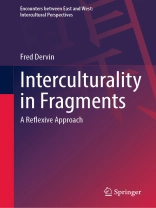This book continues the author’s long-term reflections (over 20 years of scholarship and experience in intercultural communication education) around the fascinating and yet contestable notion of interculturality in education. As an unstable and polysemic notion, interculturality deserves to be opened up again and again and there is a need to engage with it continuously, observing, critiquing and problematizing its complexities. This book urges researchers, students and interculturalists to take the time to think carefully and deeply about interculturality and to find inspiration beyond the dominating ‘Western’ ideological world of intercultural research and education.
This book starts from short fragments written by the author for himself over a period of one year. In these short statements and notes about interculturality, the author reflects creatively on the questions he had in mind at the time of writing and offers some (temporary) answers, which, in turn, are questionedand revised. Over the 1000 fragments that the author wrote, he selected about 100, for which he wrote commentaries, referring to and reviewing current research and debates on interculturality in the process. One of the specificities of the book is to be highly multidisciplinary to help us get used to looking for inspiration in other fields of research and creativity.
The fragments can be read randomly – the reader may open the book at any page and pick any fragment. The author suggests reading each individual fragment first and then the accompanying explanatory texts. While reading them, the reader is also invited to reflect on any potential addition to what the author wrote – anything they might dis-/agree with, anything they would have wanted to discuss with the author. Questions have been added at the end of each chapter for readers to reflect on and to enrich their own criticality and reflexivity. The book serves as continuous guidance for engaging with interculturality.
Daftar Isi
Introduction.- What interculturality might be not about: Misconceptions, hoaxes and intercultural speak.- What interculturality could be: Uncertainties and suggestions.- What interculturality could be: Uncertainties and suggestions.- Ideologies of interculturality: Building up awareness of the predatory and falsely critical.- Ideologies of interculturality: Building up awareness of the predatory and falsely critical.- Ideologies of interculturality: Building up awareness of the predatory and falsely critical.- Language: The substance of interculturality.- Researching interculturality otherwise.- Coda.- Bibliography.- Glossary.
Tentang Penulis
Fred Dervin is Professor of Multicultural Education at the University of Helsinki (Finland). He is Director of the TENSION research group (diversities and interculturality in education) and Acting Director of the SEDUCE (Society, culture and education) doctoral school at Helsinki. Dervin also holds several distinguished and visiting professorships in Australia, Canada, China, Luxembourg, Malaysia and Sweden. Prof. Dervin specializes in intercultural education, the sociology of multiculturalism and student and academic mobility. He has widely published in different languages on identity, the ‘intercultural’ and mobility/migration (over 150 articles and 60 books). His latest books include: Dervin, Sude, Yuan & Chen (2021) Interculturality East and West: Unthink, Dialogue, Rethink (Springer); Dervin & Yuan (2021) Revitalizing Interculturality, Minzu as a Companion (Routledge); Dervin & Jacobsson (2021) Teacher Education for Critical and Reflexive Interculturality (Palgrave Mac Millan); Dervin & Simpson (2021) Interculturality and the Political within Education (Routledge).












